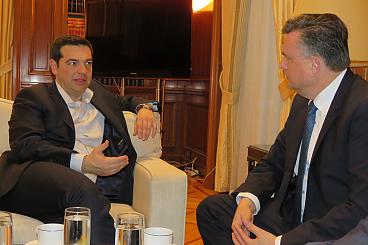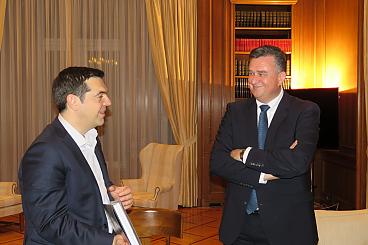Roemer in conversation with Tsipras: Greek problems are European problems
Roemer in conversation with Tsipras: Greek problems are European problems
SP leader Emile Roemer, along with the party’s Senate group leader Tiny Kox and General Secretary Hans van Heijningen, is visiting the refugee camps in Greece. Despite the massive problems with which Greece is faced, the left Syriza government is doing all it can to organise the decent reception of the refugees. On the second day of his visit, Roemer spoke with Greek Prime Minister Alexis Tsipras.
Prime Minister Alexis Tsipras had already been hard at work for the entire day when he welcomed us. He was pleased to meet political friends from the Netherlands. In the past, before he became Prime Minister, he had been a guest of the SP. His party and the SP both value good international left cooperation, especially now that there are so many common problems in Europe.

Early last year Syriza won the elections on a left platform because people were more than fed up with traditional parties, harsh austerity and corruption. Following its entry into office the new party came up, however, against an incorrigible European Union unwilling to budge a single millimetre from the spending cuts in the public sector and reductions in wages and in benefits it was determined to see.
The government put these demands to the people in a referendum, in which in August of last year they were rejected by a large majority. That did not lead, however, to any compromise on the part of the EU; the government resigned and fresh elections were called. Contrary to the EU's expectations, these were once again won by Tsipras, who was thus able to form a new government. This government has since then begun the enormous task of realising the austerity policies imposed by Europe while sparing as much as possible those who have the least. “This isn't the moment to take an intermediate position,” Tsipras tells us. “We are only at the beginning of our search for a way out of the crisis. That doesn't alter the fact that the situation in Europe over the last six months has changed enormously. In fact the Greek problems have become European problems. And that's true whether you're talking about the financial crisis, the refugee crisis or the eurocrisis. National solutions won't work any more, Europe must tackle this hand in hand or in its present form it will go under.” In recent months the Greek government has wasted no time in the implementation of the austerity programme. “We've succeeded in closing the gaps in the budget, introduced new taxes which have spared the poor, though the middle class has had to contribute, simply because you can't get the money out of the rich overnight. But also in relation to that we have made a start.” The Prime Minister reminds us that his credit with the people is not inexhaustible. “If we don't succeed within a few months in showing that there's light at the end of the tunnel, it will all have been for nothing. Then the middle class and the farmers will rebel and our country will fall prey to chaos.”

The refugee crisis has transformed the European field of play. “Greece needs Europe, but now Europe also needs Greece. The wars in Syria, Iraq and Yemen, the military regime in Egypt, the tense relations between Russia and Turkey, the political manipulation of the stream of refugees through Turkey and the fragility of most Balkan states mean that the west needs Greece in order to make the refugee problem to some degree manageable. In the refugee crisis we have taken a constructive attitude. As socialists, we have a great deal of respect for human dignity, whatever that may cost us. Whether this concerns Turkey or Germany, we are prepared to do our bit. Don't forget that last year we temporarily accommodated a million refugees at a cost of a billion euros. And don't forget either that we aren't responsible for the refugee problem. That's down to the warring parties, each of which bears some guilt. And then there are European countries who evade their responsibilities and refuse to take refugees or to pay for their accommodation. Some of these countries then are also brutal in their assessment of us and shout that we have made a complete mess of things. But in that respect I also see some improvement. Chancellor Merkel and European Commission president Juncker have recognised recently that Greece has made important improvements in the reception and registration of refugees. Apart from how my European colleagues assess our policies, I'm very concerned about where things are going with the refugee crisis.
“In a country like Austria, that's always stood by us when it came to our right to solve the financial crisis in our own fashion, I'm seeing xenophobia and right-wing populism increasing enormously. I'm noticing this tendency in other European countries too, and it represents a real danger for democracy on our continent. At the same time it seems that Turkey is turning the refugee tap on at will in order to put Europe under pressure. Our neighbouring countries are also making problems when it comes to keeping their borders open. That presents us with an exceptional threat. The borders closed, the harbours closed, Greece with a hundred thousand refugees with nowhere to turn, the tourist season completely kaput. That cannot and must not happen and I will do everything in my power to avert that calamity.”
Tsipras and Roemer were in immediate agreement that an end to the war in Syria and Iraq is a precondition for limiting the stream of refugees. 'Bread not bombs' is seen by both as the shortest way to sum up the solution. Both also agree that the role of Greece as mediator has been determined precisely by the Greek government's non-participation in the military interventions in the region. The Netherlands could also play such a role, but from that perspective contributing to the bombing in Iraq and Syria is counterproductive. As Romer notes, “Small countries can paly a major part if they play their own role instead of trying to go along with the big boys!”
Read also the report of Emile Roemer's visit to the refugee camp in Greece.
